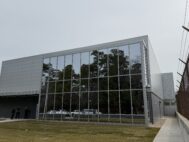Norfolk airport debuts $25M international arrivals facility
Norfolk International Airport on Wednesday celebrated the opening of its new $25 million international arrivals facility.
Hampton Roads too reliant on federal dollars, economists warn
Economists warn that the Hampton Roads region is overly reliant on federal spending and is at risk in the event of future cuts.
Norfolk Airport cancels development contract for 165-room hotel
The Norfolk Airport Authority recently canceled a contract to develop a 165-room hotel due to an alleged contract violation.
Norfolk airport taps new COO in leadership shuffle
The Norfolk Airport Authority has announced that Melinda Montgomery will become its new chief operations officer and a vice president, starting in early June.
The Breeden Co. completes $43M apartment complex in Norfolk
Virginia Beach-based real estate development firm The Breeden Co. announced Thursday that it completed construction on a 198-unit multifamily community in Norfolk, located near Norfolk International Airport.
Norfolk airport adding JetBlue service in April
JetBlue will start service from Norfolk International Airport on April 30, offering seasonal daily nonstop flights to Boston’s Logan Airport, Norfolk airport officials announced Wednesday. The airline will be the ninth commercial carrier at Norfolk’s airport, and its 140-seat Airbus A220 aircraft will depart Norfolk at 6 p.m., arriving at 7:29 p.m. in Boston daily […]
Latest and greatest
By late spring, surf will be up at Atlantic Park on the former site of The Dome, Virginia Beach’s distinctive geodesic dome convention center and concert hall that was torn down in 1994. Atlantic Park, a $350 million mixed-use entertainment venue and surf lagoon project at the Oceanfront, is the highest profile project in the […]
Flying high
Norfolk International Airport is on track to have the best year since its 1938 opening. In June, the airport reported a 7.5% increase in passenger activity, with 431,637 passengers — up from last June’s figure of 401,517, marking the largest number of June passengers in the airport’s history. During the first six months of 2023, […]
Not by coincidence
Norfolk Mayor Kenneth Cooper Alexander has a vision for his city that includes increasing revenue without creating additional taxes for residents. His focuses in achieving that goal include tourism, hospitality and entertainment — familiar parts of neighboring Virginia Beach’s economy. However, unlike Virginia Beach, he points out, Norfolk doesn’t have a reliable seasonal tourism ba[...]
Norfolk airport hotel is ‘desperately needed’
An influx of 200-seat airplanes is bringing record numbers of passengers into Norfolk International Airport, leading officials to fast-track infrastructure upgrades and pursue construction of an airport hotel. There is high demand for on-site lodging, especially among airline crews and travelers taking early morning flights, who often stay at downtown Norfolk hotels, says Norfolk Airport […[...]
Sharing the wealth
Virginia small businesses are getting a piece of the biggest highway construction pie ever baked by the Virginia Department of Transportation: the $3.9 billion Hampton Roads Bridge-Tunnel expansion project. Since April 2019, VDOT has awarded 313 contracts worth a collective $455 million to companies that qualify under the Disadvantaged Business Enterprise (DBE) and Small, Women-owned, […]
FOR THE RECORD
CENTRAL VIRGINIA AutoZone Inc. plans to build a $185.2 million warehouse and distribution center in New Kent County, creating 352 jobs, Gov. Glenn Youngkin announced in February. The 800,000-square-foot facility will serve as the auto parts company’s East Coast distribution operation. Based in Memphis, Tennessee, AutoZone has more than 6,000 stores nationwide and reported $14.6 […]






















